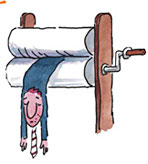
 My instant review of Twitter's new business plan
My instant review of Twitter's new business plan 
 There's something deeply unsettling about Twitter's new crackdown on publishers who run ads through Twitter. Actually there are many things that are unsettling about it.
There's something deeply unsettling about Twitter's new crackdown on publishers who run ads through Twitter. Actually there are many things that are unsettling about it.
1. First, it's not at all clear what the new policy is. They've said you have to share revenue with them if you run ads through Twitter. But is it an ad if I pass through a link to a page with an ad on it?
2. They said, in a phone interview, they'll only ask for money from people who do a lot of this. What about Huffington Post? We love them, they say. But they don't say they won't ask for a cut.
3. This new policy totally contradicts everything they've been saying about developers and publishers over the years. Okay they don't have to be consistent. What will they change next?
4. Twitter is gradually encroaching on the roles of its developers, publishers, even plain old users. Where does this end? My prediction: It ends with us all being couch potatoes. Watching the Britney Spears Channel or the Barack Obama Channel or the Comcast Cares Channel, and going elsewhere for the free-for-all that Twitter used to be.
5. Very ironic that Dick Costolo is the guy implementing this. His Feedburner company could have chipped in a percent of revenue to help RSS, because without our work to create an open format for him to build on, he wouldn't have had a business. His pitch sounds like the one I would have made if we had talked before he launched Feedburner.
 6. The biggest difference between an open platform and a corporate-owned platform -- he can change the rules after we've all invested. With an open platform, you know the rules when you start, and they can't be changed later.
6. The biggest difference between an open platform and a corporate-owned platform -- he can change the rules after we've all invested. With an open platform, you know the rules when you start, and they can't be changed later.
7. Tomorrow I'm giving a talk at the NY Times about platforms for publishing. We will talk about this. Publishers can not depend on Twitter to be a steady platform that will be fair to them. Twitter might claim the right to charge the Times to push links to its stories through Twitter because they all have ads on them. If not today, sometime down the road. The Times owns its own printing press, for good reason. It should own its own digital press as well.



